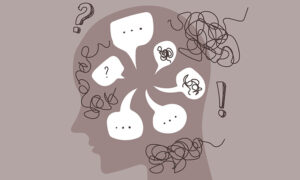Getting stuck with the same thoughts running through your mind can feel like a never-ending cycle. While it’s normal for humans to ruminate now and then, for a woman with ADHD it tends to be even more prone to rumination than others. If this sounds like you, don’t worry! I am here to share my tips to stop your ruminating thoughts and replace them with healthier thought patterns. So you may be asking yourself, “What is rumination? Rumination is the cognitive process of obsessively repeating the same thoughts, over and over. Typically, ruminating thoughts are excessive, intrusive, and negative and can result in emotional distress/ There are two main types of ruminating thoughts: negative and anxious.
Negative thoughts – Remember that feeling you remember a moment you felt regret or embarrassment, and you can’t help but cringe? Those are the brain’s negative ruminating thoughts taking us to the past. In a way, we’re reliving that negative moment on repeat. And the more we relive it, the more negative our general thoughts and outlooks become.
Anxiety & thoughts- Anxiety comes from the worries about the future — a fear of the unknown, if you will. Those anxious thoughts are the mind’s way of trying to be in control of future situations, which induces fear. (Because we all know that no one controls the future! Except for our brains. They apparently don’t know that. Eventually, this fear turns into a cycle of rumination and anxiety that you can get sucked into for hours or days.
Why is it common for women with ADHD to ruminate? These ruminations can overwhelm other ideas and become part of obsessive thinking commonly associated with ADHD. It can feel like the harder you try to avoid these thoughts, the more they persist. Rumination in people with ADHD can also be related to Rejection sensitivity dysphoria With RSD, we tend to reflect excessively on past or upcoming experiences in a negative or anxious way.
Rumination doesn’t have to take over your ADHD experience. Instead, here are some tips and tools to keep it at bay.
Engage Your Senses – Try something to get into your body when you notice those ruminating thoughts and feel like you may lose control. These tips engage your senses and can help remove fear and worry to pull you back to the present.
Here are a few suggestions:
Take an ice-cold shower or put your face in a bowl of ice water.
Put on a song you like and dance.
Jump up and down to get your blood pumping.
Eat something spicy or sour.
Find A Distraction That Requires Your Full Attention Distracting yourself doesn’t have to be as jarring as jumping in a cold shower. It can be anything that requires your full attention, such as:
Going for a run
Playing a video game
Practicing an instrument
Gardening
Consider what the opposite thought may be- Imagining the opposite of our worrying can help loosen rumination’s hold. For example, if you’re ruminating about something you said that might have been misunderstood, consider the opposite of your worry, and write it down. For instance, you could instead consider that you were understood perfectly well, and that there won’t be any negative consequences. Write that down. Putting things onto paper communicates to your brain that there are other possibilities,
Create an empowering mantra for yourself.- A great way to combat rumination is to create a mantra that brings you back to your power. Here are some sample mantras you can use and repeat when these thoughts manifest.
I am worthy of love.
I did not ruin my niece’s birthday party. (or whatever you’re worried about ruining)
I can trust them.
I am proud of who I am.
Coach Jenna’s Final Thoughts –Rumination is a repetitive thought pattern that can be negative (focusing on the past) or anxious (focusing on the future). It is common in women with ADHD and can cause emotional distress. It’s not the same as overthinking, which is when someone excessively thinks about simple things before taking action. You can regulate negative ruminations with techniques such as grounding oneself in the present, finding positive distractions, considering the opposite thought, creating an empowering mantra, and seeking support from others. So, it’s important to recognize when you’re ruminating and take the necessary steps to address it to improve mental health and well-being.
